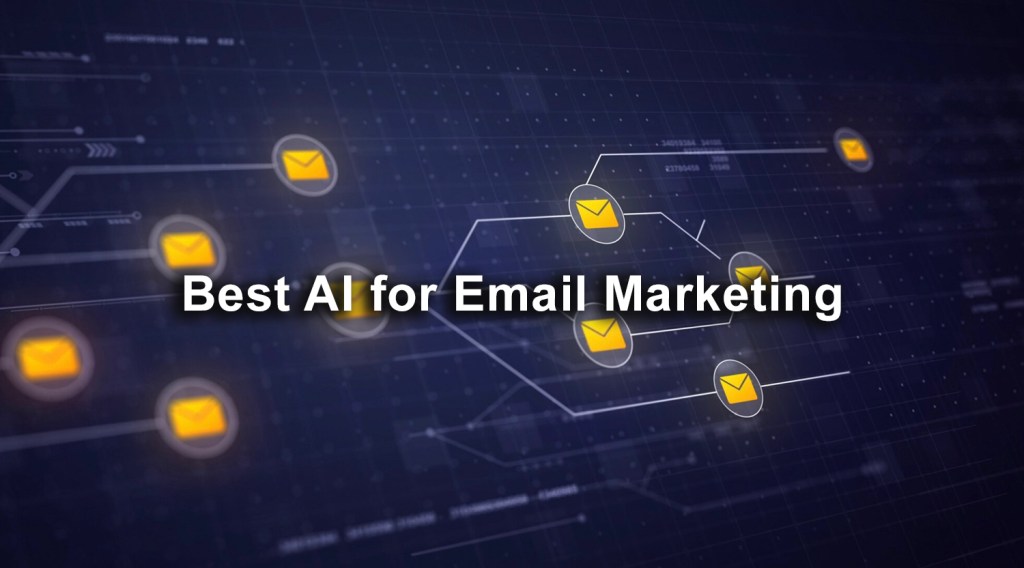Updated: Jan 02, 2024 By: Dessign Team

AI tools and machine learning have revolutionized email marketing, offering advanced capabilities to handle large amounts of data, automate tasks, personalize emails, and improve deliverability.
These tools have transformed the field of email marketing, providing marketers with powerful solutions to enhance their campaigns and drive success.
In this article, I will share my top picks for the best AI tools for email marketing, specifically designed to help you achieve optimal results in the US market.
1. Phrasee
Phrasee uses advanced AI to optimize email subject lines, ensuring they're compelling and boost open rates. It generates and tests different subject lines to find what works best for specific audiences.
Key Features:
- AI-Powered Language Generation: Creates optimized email subject lines.
- Multivariate Testing: Tests various subject lines to find the best fit.
- Real-Time Analysis: Provides insights on the fly.
- Language Model: Adapts to brand voice and guidelines.
- Predictive Analytics: Forecasts subject line performance.
Pros:
- Enhances email open rates.
- Adapts to brand-specific language and tone.
- Provides actionable insights.
Cons:
- Sole focus on subject lines might seem narrow.
- Learning curve for understanding all features.
- Premium pricing model.
2. Drift
Drift is predominantly known as a conversational marketing platform, but its email marketing capabilities stand out too. With AI, it powers targeted email campaigns based on user behavior and engagement.
Key Features:
- Conversational AI: Engages users in real-time.
- Behavioral Email Targeting: Sends emails based on user actions.
- Personalization at Scale: Customizes emails for each recipient.
- Integration with CRMs: Syncs seamlessly with tools like Salesforce.
- Trackable Metrics: Provides insights into email performance.
Pros:
- Enhances user engagement with real-time interactions.
- Efficiently segments and targets email lists.
- Robust analytics and reporting.
Cons:
- Mainly known for its chatbot, email features might be overlooked.
- Might be overkill for small businesses.
- Pricing can be on the higher side.
3. Customer.io
Customer.io is an automated messaging platform that harnesses AI to send targeted emails based on user behavior and segmentation.
Key Features:
- Behavioral Triggers: Sends emails based on user actions.
- Advanced Segmentation: Group users based on detailed criteria.
- Automation Workflows: Set up email campaigns that run automatically.
- A/B Testing: Test variations to determine the most effective email.
- Real-Time Data: Insights and analytics on user behavior.
Pros:
- Delivers personalized user experiences.
- Integration with multiple third-party platforms.
- Intuitive and user-friendly interface.
Cons:
- Might require some time to set up initially.
- Advanced features come with a learning curve.
- Cost can add up with more contacts.
4. Omnisend
Omnisend focuses on e-commerce email marketing, offering automation tools designed for online retailers. Its AI capabilities ensure targeted and personalized emails that drive conversions.
Key Features:
- E-commerce Integration: Seamlessly syncs with major e-commerce platforms.
- Product Picker: Easily add products to emails.
- Cart Abandonment Emails: Automated reminders for unfinished purchases.
- Segmentation based on Purchase Behavior: Group users based on their buying habits.
- Pre-built Workflows: Simplified automation for various campaigns.
Pros:
- Tailored specifically for e-commerce businesses.
- Increases conversion rates with targeted campaigns.
- User-friendly with pre-built templates and workflows.
Cons:
- Might not be suitable for non-e-commerce businesses.
- Some integrations might require additional setup.
- Pricing increases with advanced features and more contacts.
5. Postcards
Postcards is an intuitive drag-and-drop email builder that allows users to create attractive and responsive email templates without having to delve deep into coding. It is an ideal tool for businesses and individuals looking to enhance their email marketing campaigns.
Key Features:
- Drag-and-Drop Interface: Easily design emails with a user-friendly interface.
- Rich Template Library: Access to a multitude of professional designs.
- Responsive Design: Emails look great on all devices and email clients.
- Inline CSS: Ensures compatibility with most email clients.
- Customizable Modules: Personalize your emails based on your requirements.
Pros:
- User-friendly, no coding experience required.
- Wide variety of modern and professional templates.
- Efficient customer support.
Cons:
- Limited advanced features for seasoned designers.
- Some limitations in template customization.
- Premium features come with a cost.
6. Unspam.email
Unspam.email is a testing tool that allows users to check how their emails will appear in various email clients and ensure they don't end up in spam folders. This platform helps in refining email campaigns for better deliverability.
Key Features:
- Email Preview: See how emails render in different email clients.
- Spam Test: Determine if your email triggers spam filters.
- Link Checker: Ensure all links within emails are functional.
- Content Analysis: Receive feedback on your email content.
- Deliverability Score: Get a score based on the likelihood of your email landing in the inbox.
Pros:
- Comprehensive email testing tool.
- Improves email deliverability rate.
- Efficient in spotting potential deliverability issues.
Cons:
- Might be overwhelming for beginners.
- Some advanced features may require a learning curve.
- Monthly subscription can be costly for small businesses.
7. Seventh Sense
Seventh Sense is an AI-powered platform that optimizes email delivery times and frequency. It analyses recipient behavior to ensure emails are sent when they're most likely to be opened.
Key Features:
- Optimal Send Time: AI determines the best time to send emails for each recipient.
- Engagement Analysis: Tracks and assesses recipient engagement.
- Integrate with Major Email Platforms: Seamlessly integrate with platforms like HubSpot and Marketo.
- Frequency Optimization: Adjusts the frequency of emails based on recipient behavior.
- Engagement-Based Segmentation: Group recipients based on their interaction levels.
Pros:
- Increases email open rates.
- Customizable and intuitive dashboard.
- Reduces the chance of emails being marked as spam.
Cons:
- Reliant on accurate data for best results.
- Might be costly for small businesses.
- Setup and integration might require technical know-how.
Benefits of AI Tools for Email Marketing
The benefits of using AI tools for email marketing are vast and can transform your campaign's effectiveness. These tools utilize advanced machine learning algorithms to handle large amounts of data, automate repetitive tasks, and personalize email content, resulting in improved engagement and higher conversion rates.
One of the key advantages of AI tools for email marketing is their ability to optimize subject lines. These tools analyze past data and generate subject lines that are more likely to capture attention and entice recipients to open the email. By leveraging AI-powered subject line optimization, you can significantly increase your open rates and improve overall email performance.
AI tools also excel in determining the optimal send times for each individual recipient. Through data analysis and predictive analytics, these tools identify patterns and trends to determine when each contact is most likely to engage with your emails. By sending emails at the right time, you can maximize open rates and ensure your messages reach your audience when they are most receptive.
Advantages of AI Tools for Email Marketing
Segmentation is another area where AI tools shine. These tools can automatically analyze and segment your email lists based on various factors such as demographics, past interactions, and purchase history. By sending targeted and personalized content to specific segments, you can deliver more relevant messages to your audience, thereby increasing engagement and conversion rates.
Furthermore, AI tools for email marketing offer significant benefits in terms of improving deliverability rates. These tools leverage machine learning algorithms to analyze email deliverability patterns, identify potential issues, and optimize sender reputation. By ensuring that your emails consistently reach the inbox instead of the spam folder, you can maximize the impact of your email campaigns.
In conclusion, the benefits of using AI tools for email marketing are undeniable. From optimizing subject lines to determining the best send times, these tools offer advanced features that can greatly enhance your campaign's effectiveness.
However, it is important to carefully select reputable AI software and mitigate associated risks such as false information and privacy concerns. With the proper use and implementation of AI tools, you can take your email marketing efforts to new heights and achieve greater success in engaging your audience.
Conclusion
In conclusion, AI tools are a game-changer for email marketing, offering powerful features that can significantly boost conversions and engagement with your audience.
By utilizing AI tools, you can handle vast amounts of data, automate repetitive tasks, and personalize your emails to create a more tailored and engaging experience for your subscribers. These tools also provide insights into the optimal send times and help improve deliverability rates.
However, it's important to consider the potential risks associated with AI tools, such as false information, privacy concerns, and potential plagiarism. Therefore, it is crucial to select reputable and trusted AI software to ensure the reliability and integrity of your email marketing efforts.
With careful selection and proper use of AI tools, you can enhance your email marketing strategies and achieve greater success in engaging your audience, driving conversions, and ultimately growing your business.
FAQ
What are the benefits of using AI tools for email marketing?
AI tools offer benefits such as handling large amounts of data, automating tasks, personalizing emails, and improving deliverability rates.
What are some popular AI tools for email marketing?
Some popular AI tools for email marketing include Postcards, Unspam.email, Seventh Sense, Phrasee, Drift, Customer.io, Zeta Global, and Optimove.
How can AI tools help in email marketing?
AI tools can assist with tasks like defining subject lines, determining optimal send times, segmenting email lists, and personalizing content.
What are the risks associated with using AI tools for email marketing?
Risks include potential false information, privacy concerns, and the possibility of plagiarism. Careful selection and proper use of reputable AI software can mitigate these risks.



